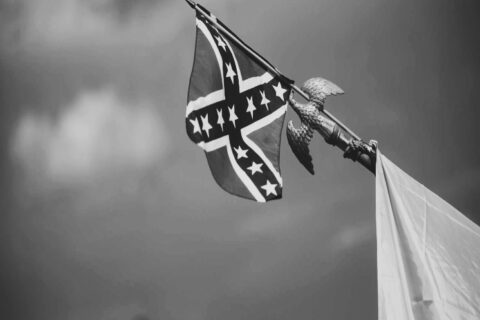White Guilt is one of the primary afflictions plaguing our people in the modern day. It is the instilled feelings of guilt and sorrow over the supposed exploitation, suppression, and abuse of non-whites and non-Europeans over the centuries, or perhaps even the millennia. It is a paralytic toxin which renders the white European of many a nation unable to act in his own defense or that of his neighbor; it renders him impotent in carrying the torch of his civilization and heritage. Yet interesting, although not overly surprisingly, this despair is not ever really applied to wars or acts of malice of white unto white.
Many Heritage Americans can boast of family service in every war from the Revolution, sometimes predating it; but it seems none of them ever ask themselves if this is an area where their white guilt would actually apply. Making a case for most of America’s wars is possible, however for the purposes of this article, only the War of Northern Aggression matters. Many people, especially in the more western states, who have this sort of lineage, can look upon forefathers who wore blue, and others who wore grey. Take the Southwest for a prime example. It’s an area settled primarily by Southerners, mostly the Deep South, sprawling out from east Texas over the hill and prairie and into the deserts and mesas; yet also receiving an incredible influx of immigrants from the Midwest and old Northwest to take advantage of the booming resource extraction industries. These “tumbleweed people” are the product of pioneers and settlers braving the frontier and the dangers therein in order to build a better life. For the Southerner, he was likely fleeing the desolation of Reconstruction. For the Midwesterner, he was likely a younger son looking to claim his own plot of land and homestead. Over the generations, the mixing of these groups produced a different kind of folk, akin to both, but distinctly neither, who would go on to populate the lower Rocky Mountain states, aka the Southwest. When the subject of the War is brought up in their education, it is entirely from the pro-Union standpoint of the Empire, and is therefore basically just propaganda.
Many Southwesterners who look into their history know, however, that the matter was not so black and white, and they eventually come to the realization that they exist because of war crimes on behalf of the Union unto the Confederacy. They look into their family tree to find an ancestor who’s brothers fell in battle under the battle flag, forcing the family to up and leave their ancestral holdings in Tennessee and to try their luck in the frontiers of southern Colorado. There, this family would go on to mix with descendants of an Iowan Cavalryman with a storied combat record, who used his veteran’s pension to obtain his plot of Colorado land where he’d take a daughter of Tennessee as his bride. It is situations like these, and only these, where any concept of white guilt should ever be relevant. Living with the knowledge that forefathers of yours contributed to the downfall of a country and cause that you, their descendant, would take up a century and a half later, can feel almost shameful.
Many traditionalists, both admirably and regrettably, attempt to doggedly follow in the footsteps of their forefathers. So, for the children of the tumbleweeds, it falls upon them to choose their own legacy. Do they idolize the Midwestern infantry or the horseman from Tennessee? If morality matters at all, then the latter is the only possible conclusion. When the lens of history is applied to that war, atrocity after atrocity is committed onto Dixie by the Empire. For people of conscience, of law and of decency, the only place left to go is the admission that your forefathers in blue, for all their courage and strength, were the villains, and had you been time warped to that time and place, you’d find yourself eyeing them from the opposing side of the battlefield. The only white guilt to be felt is the guilt of taking up of arms between kin who have fallen so far from one another.
Such as it is for the children of the tumbleweeds rolling over mountains and through valleys out west. The politics of the region are increasingly divisive as outsiders have more and more control, nearing dominance with every passing year. These divisions and tensions among whites in the area are often interfamilial and personal, as the general anarcho-libertarian default view of the native inhabitants is colored by modern partisanship and the lens upon which they view history.
Ultimately, the only deciding factor is what triggers their sense of white guilt: Wounded Knee or Appomattox.

Are you gonna pull those pistols or whistle ‘Dixie’?




